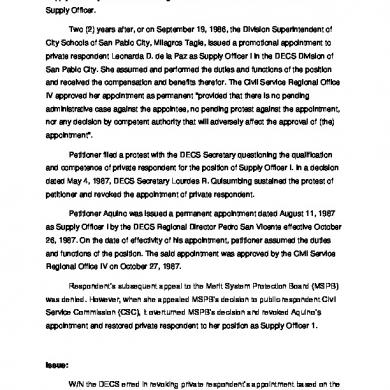J20. Csc Vs. Alfonso G.r. No. 179452
This document was uploaded by user and they confirmed that they have the permission to share it. If you are author or own the copyright of this book, please report to us by using this DMCA report form. Report DMCA
Overview
Download & View J20. Csc Vs. Alfonso G.r. No. 179452 as PDF for free.
More details
- Words: 634
- Pages: 1
Loading documents preview...
CIVIL SERVICE COMMISSION vs. LARRY M. ALFONSO G.R. No. 179452 June 11, 2009 Facts: Respondent Larry M. Alfonso is the Director of the Human Resources Management Department of PUP. On July 6, 2006, an Affidavit-Complaint filed against Alfonso for violation of Republic Act (RA) No. 6713, charging the latter with grave misconduct, conduct prejudicial to the best interest of the Service, and violation of Civil Service Law, rules and regulations. The affidavit-complaint was lodged before the Civil Service Commission (CSC). The affidavit alleged that respondent repeatedly abused his authority as head of PUP’s personnel department. The CSC charged Alfonso with grave misconduct and conduct prejudicial to the best interest of the Service, and imposing a 90-day preventive suspension against him. Respondent argued that the CSC had no jurisdiction to hear and decide the administrative case filed against him. The PUP Board of Regents that has the exclusive authority to appoint and remove PUP employees pursuant to the provisions of R.A. No. 8292 in relation to R.A. No. 4670. Without ruling on the motion, the head of CSC-NCR, issued an Order directing the Office of the President of PUP to implement the preventive suspension order against respondent. Respondent sought relief before the CA via a petition for certiorari and prohibition. CA rendered a Decision in favor of Alfonso. Issue: Whether the CSC has jurisdiction to hear and decide the complaint filed against Alfonso. Held: We find in favor of petitioner. SECTION 9 Powers and Functions of the Commission. – The Commission shall administer the Civil Service and shall have the following powers and function: (j) Hear and decide administrative disciplinary cases instituted directly with it in accordance with Section 37 or brought to it on appeal; Section 37.Disciplinary Jurisdiction. – (a) The Commission shall decide upon appeal all administrative disciplinary cases involving the imposition of a penalty of suspension for more than thirty days, or fine in an amount exceeding thirty days’ salary, demotion in rank or salary or transfer, removal or dismissal from Office. A complaint may be filed directly with the Commission by a private citizen against a government official or employee in which case it may hear and decide the case or it may deputize any department or agency or official or group of officials to conduct the investigation. The results of the investigation shall be submitted to the Commission with recommendation as to the penalty to be imposed or other action to be taken. We are not unmindful of certain special laws that allow the creation of disciplinary committees and governing bodies in different branches, subdivisions, agencies and instrumentalities of the government to hear and decide administrative complaints against their respective officers and employees. Be that as it may, we cannot interpret the creation of such bodies nor the passage of laws such as – R.A. Nos. 8292 and 4670 allowing for the creation of such disciplinary bodies – as having divested the CSC of its inherent power to supervise and discipline government employees, including those in the academe. Equally significant is the fact that he, Alfonso, had already submitted himself to the jurisdiction of the CSC when he filed his counter-affidavit and his motion for reconsideration and requested for a change of venue from the CSC-Central Office to the CSC-NCR. It was only when his motion was denied that he suddenly had a change of heart and raised the question of proper jurisdiction. This cannot be allowed because it would violate the doctrine of res judicata, a legal principle that is applicable to administrative cases as well. At the very least, respondent’s active participation in the proceedings by seeking affirmative relief before the CSC already bars him from impugning the Commission’s authority under the principle of estoppel by laches. In this case, the complaint-affidavits were filed by two PUP employees.
Related Documents

J20. Csc Vs. Alfonso G.r. No. 179452
January 2021 0
30. Aquino Vs Csc, Gr No. 92403
January 2021 0
12 Blaquera Vs Csc
February 2021 0
Napocor Vs Philipp Bros - Gr No 126204 - Digest
March 2021 0
People Vs. Abilong Gr No. L-1960 - Digest
March 2021 0
People Vs Roger Tulin Digest Gr No. 111709
February 2021 1More Documents from "Rofy Laureano Lagundino"
